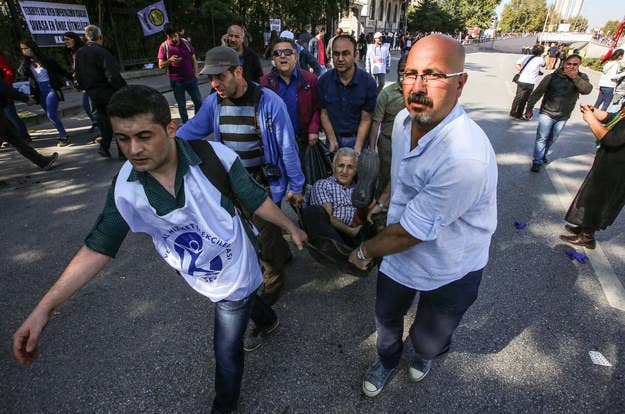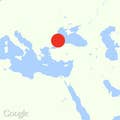
ISTANBUL — The twin bombings in the heart of Turkey's capital that killed scores gathering for a peace rally on Saturday morning was the deadliest attack on civilians in the country's recent history.
The attack, in Turkey's capital of Ankara, seemed designed to plunge the country at Europe's border into the cauldrons of war and ethno-sectarian strife plaguing the rest of the Middle East. Its casualty count of at least 86 people dead and about 200 injured, many of them ethnic Kurds and their supporters, was reminiscent of terrorist attacks on the marketplaces of Baghdad or barrel bombs dropped on residential blocks of Aleppo rather than the capital of a rising country vying for ascension to the European Union.
But despite heated rhetoric and recriminations in the attack's aftermath, the country's political leadership on all sides appears eager not to let the country be derailed by the attack. Even the country's president, Recep Tayyip Erdogan, accused of callousness in the aftermath of two previous terror attacks on Kurds, condemned "attacks that are aimed at our unity."
Turkey serves as a key partner in the effort to fight against ISIS, recently giving the U.S. permission to fly combat and assault drone missions into Syria and Iraq out of bases along the country's southern border. ISIS has vowed retribution, and also has a beef with the Kurdistan Workers Party, or PKK, whose partners in Syria are fighting the group for control of key northern towns.
The attack occurred at Ankara's main train station just as a collection of mostly Kurdish-affiliated civil society groups gathered for what was described as peace rally but was more like a political event for supporters of a Kurdish-led opposition party. It came just weeks before crucial elections on Nov. 1, meant to break the deadlock that emerged from general elections in June, when the Justice and Development Party, or AKP, of President Recep Tayyip Erdogan failed to secure enough seats in parliament to form a government on its own and pursue ambitions of elevating the presidency by changing the constitution.
Its failure was largely the result of a surge in support for the Democratic People's Party, or HDP, a Kurdish-rooted party that managed to draw votes from liberals and leftists as well as pious Kurds who had previously supported the AKP.
The election results, as well as the re-ignition of the decades-old war between the Turkish government and the Kurdistan Workers Party, known as the PKK and affiliated with the HDP, heightened the country's political instability, pounding the currency and pushing the country into a new era of uncertainty.
The question of rights for Turkey's large Kurdish minority central to the country's identity and democratic future. The attack Saturday, described as two or three explosions perhaps carried out by one or more suicide bombers, seemed designed to stab at the country's most vulnerable political and historical soft spot.
The PKK had announced recently that it was willing to abide by a ceasefire ahead of elections. One Western diplomat described the attack as a "spoiler," a pure act of provocation "meant to sabotage the pace deal." ISIS members had warned that they would launch attacks on Kurds to destabilize Turkey and to keep the PKK and Turkey at war with each other instead of with the millennialist jihadi group.
HDP leader Selattin Demirtas and others implicitly blamed the government for the attack, or at least for not preventing it. In recent weeks pro-government protesters have held provocative rallies, sometimes outside the offices of opposition newspapers and political parties.
#Demirtaş: Gang leaders can hold safe rallies in this country, but those who want peace are murdered.
Our Co-Chair #Demirtaş: This attack is not targeting our state and national unity, it is perpetrated by the state against the people.
The HDP issued a statement on its English-language website alleging that "there were no police around the crime scene when the explosion occurred," once riot police arrived 15 minutes later, "they attacked by tear gas bombs against the people who intended to help injured people."
The attack in Ankara followed ones targeting an HDP rally ahead of the elections in June in the city of Diyarbakir which left four dead and a rally in Suruc in support of Kurds fighting ISIS in Syria, which left dozens dead and prompted the PKK to end a two-year ceasefire. Some analysts have noted that those attacks, which ISIS claimed responsibility for, could be seen as attempts to sabotage Kurds' political ambitions.
Prime Minister Ahmet Davutoglu suggested that the PKK or one of its offshoots, along with ISIS, could be behind the attack, echoing whispers from those close to Erdogan's camp that the bombing was an attempt to build sympathy for Kurds. And the country's increasingly obsequious broadcast media declined to identify the attack as one on Kurds, noting only that it had taken place in Ankara.
But despite the public recriminations, the PKK immediately announced after the bombing that it would abide by the ceasefire. "The attack may have been meant to sabotage the ceasefire, but it didn't work," said one HDP insider, speaking on condition of anonymity because he was not authorized to speak to the press. "The PKK even moved the ceasefire up a day."
Turkish authorities also appear to be modifying their behavior. In the past, Turkish authorities seemed to shrug at such terror attacks on Kurds, said the Western diplomat, waiting two or three days before condemning it. "The message was, 'They had it coming,'" the diplomat said.
This time Erdogan and others quickly condemned the attack: "There is no difference between the previous attacks against our soldiers, police officers, village guards, public officials, and innocent citizens and this terrorist attack against civilians at an Ankara train station today," Erdogan was quoted as saying.
Mike Giglio contributed to this report.

